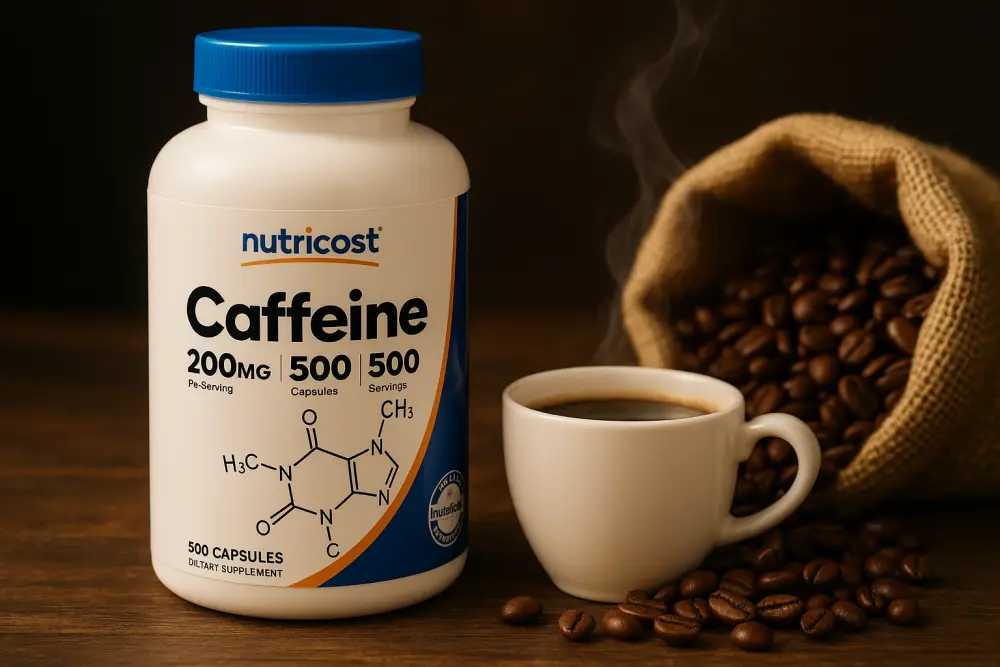Caffeine Pills for Fat Loss: Evidence-Based Guide + Buyer’s Tips
Written by a nutrition & performance specialist—clear, practical, and safe.
Many people sip coffee or energy drinks for weight control, but if your goal is fat loss, there’s a strong case for choosing
caffeine pills for fat loss instead. Pills provide precise dosing, zero sugar, and no hidden calories—key advantages when you’re managing intake.
How Caffeine Supports Fat Loss (In Plain English)
- Thermogenesis & metabolic rate: Caffeine can modestly increase energy expenditure and fat oxidation for several hours after intake.
- Performance & adherence: Better alertness and perceived effort often translate into higher-quality workouts and more daily movement—both critical for fat loss.
- Appetite & focus: Many users report short-term appetite blunting and improved concentration, which can help you stick to your plan.
That said, more isn’t always better. Excess caffeine can cause jitters, anxiety, nausea, irritability, rapid heart rate, and poor sleep,
which can undermine fat loss. The sweet spot is a sensible, consistent dose timed away from bedtime.
Coffee vs. Energy Drinks vs. Caffeine Pills for Fat Loss
All three deliver caffeine, but they aren’t equal for body-composition goals:
| Option | Typical Calories | Sugar | Dose Accuracy | Notes |
|---|---|---|---|---|
| Coffee (black) | ~2–5 kcal (without add-ins) | 0 g (unless sweetened) | Low–Moderate (varies by brew) | Easy to overdo with creamers/syrups; caffeine per cup varies widely. |
| Energy drinks | Often 0–250+ kcal | 0–60 g | Moderate (per can) | Can contain sugars and “mystery blends”; watch labels and serving sizes. |
| Caffeine pills | 0 kcal | 0 g | High (fixed mg per capsule) | Best for precise dosing and calorie control—ideal for fat loss. |
Product Spotlight: Nutricost Caffeine (200 mg Caffeine Anhydrous)
If you’re switching from coffee to pills, a high-quality, simple formula is exactly what you want.
Nutricost Caffeine capsules deliver 200 mg caffeine anhydrous per capsule (about the caffeine in ~2 cups of coffee) with zero sugar and zero calories.
- Pure, predictable dose: 200 mg per capsule for consistent effects and easy tracking.
- Sizes that fit your plan: Available in 120, 250, and 500-count bottles.
- Quality focused: Popular with athletes, casual gym-goers, and busy professionals who want clean energy without the extras.
- Flexible use: Take the capsule as-is, or open and mix the powder into a beverage (note: taste is naturally bitter).
- Calorie-free advantage: Perfect for cutting phases and anyone avoiding sugary beverages.
Shop Nutricost Caffeine 200 mg (Choose 120 / 250 / 500 Count)
Expert Dosing Guide for Fat Loss
Goal: Enough caffeine to lift energy and training quality—without wrecking sleep or causing jitters.
- Start low: Begin with 100 mg (½ capsule) once daily for 2–3 days.
- Standard dose: Increase to 200 mg (1 capsule) once daily in the morning or 30–45 minutes pre-workout.
- Upper limit: Most healthy adults should keep total daily caffeine ≤ 400 mg from all sources. Do not exceed 2 capsules in 24 hours with this product.
- Protect your sleep: Avoid dosing within 8 hours of bedtime—sleep loss blunts fat loss.
- Cycle if needed: 5–6 weeks on, 1–2 weeks off can help maintain sensitivity.
Who should avoid or seek medical advice first? Pregnant or breastfeeding individuals; people under 18; those with heart rhythm issues, uncontrolled blood pressure, anxiety disorders, GI ulcers, or who take stimulant/psychiatric meds.
What About Coffee for Weight Loss?
Moderate coffee (e.g., 1–2 cups/day) can fit into a fat-loss plan, especially if you avoid added sugars and creamers.
However, brew strength and cup size make caffeine content unpredictable, and sweet add-ins add calories fast.
Pills win for dose precision, zero calories, and consistent routine.
Keep in mind: chronic overuse of caffeine—whether from coffee, energy drinks, or pills—can lead to sleep deprivation and the classic side effects
(accelerated heartbeat, anxiety, irritability, nausea, jitteriness, and disturbed sleep). Smart dosing keeps the benefits while minimizing risks.
Make Your Caffeine Work Harder: The 5-Part Fat-Loss Stack (Lifestyle)
- Protein at every meal: Aids satiety and preserves lean mass while dieting.
- Fiber & hydration: High-volume, low-calorie foods and adequate water reduce hunger.
- Resistance training 2–4×/week: Protects muscle and elevates resting energy expenditure.
- Walking baseline (7–10k steps): Non-exercise activity multiplies calorie burn without extra stress.
- Sleep 7–9 hours: Poor sleep increases cravings and blunts fat loss—don’t let caffeine sabotage this.
FAQ: Caffeine Pills for Fat Loss
How fast do caffeine pills work?
Most people feel effects within 15–45 minutes. Pills can hit faster than sipping coffee because the full dose is taken at once.
Can I take them on an empty stomach?
You can, but some people feel nausea. If that’s you, take with food and some water.
Are pills better than coffee?
For fat loss specifically, pills usually win: precise dose, zero calories, and no sugar. If you love the taste of coffee, you can still enjoy a small cup—just keep calories in check and watch total daily caffeine.
What’s the best time to take a pill for fat loss?
Morning or 30–45 minutes before training. Avoid late-day use to protect sleep.
Ready to Try a Clean, Calorie-Free Boost?
If you want predictable energy with zero sugar and a precise 200 mg dose,
Nutricost Caffeine is a simple, high-quality choice available in 120, 250, and 500-count bottles.
Get Nutricost Caffeine 200 mg Now
Disclaimer: This article is for educational purposes and is not medical advice. Consult your healthcare professional before starting any supplement, especially if you have medical conditions or take medication.

